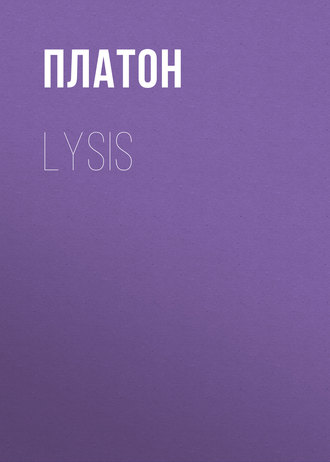
Платон
Lysis
True.
And therefore you are not conceited, having nothing of which to be conceited.
Indeed, Socrates, I think not.
When I heard him say this, I turned to Hippothales, and was very nearly making a blunder, for I was going to say to him: That is the way, Hippothales, in which you should talk to your beloved, humbling and lowering him, and not as you do, puffing him up and spoiling him. But I saw that he was in great excitement and confusion at what had been said, and I remembered that, although he was in the neighbourhood, he did not want to be seen by Lysis; so upon second thoughts I refrained.
In the meantime Menexenus came back and sat down in his place by Lysis; and Lysis, in a childish and affectionate manner, whispered privately in my ear, so that Menexenus should not hear: Do, Socrates, tell Menexenus what you have been telling me.
Suppose that you tell him yourself, Lysis, I replied; for I am sure that you were attending.
Certainly, he replied.
Try, then, to remember the words, and be as exact as you can in repeating them to him, and if you have forgotten anything, ask me again the next time that you see me.
I will be sure to do so, Socrates; but go on telling him something new, and let me hear, as long as I am allowed to stay.
I certainly cannot refuse, I said, since you ask me; but then, as you know, Menexenus is very pugnacious, and therefore you must come to the rescue if he attempts to upset me.
Yes, indeed, he said; he is very pugnacious, and that is the reason why I want you to argue with him.
That I may make a fool of myself?
No, indeed, he said; but I want you to put him down.
That is no easy matter, I replied; for he is a terrible fellow – a pupil of Ctesippus. And there is Ctesippus himself: do you see him?
Never mind, Socrates, you shall argue with him.
Well, I suppose that I must, I replied.
Hereupon Ctesippus complained that we were talking in secret, and keeping the feast to ourselves.
I shall be happy, I said, to let you have a share. Here is Lysis, who does not understand something that I was saying, and wants me to ask Menexenus, who, as he thinks, is likely to know.
And why do you not ask him? he said.
Very well, I said, I will; and do you, Menexenus, answer. But first I must tell you that I am one who from my childhood upward have set my heart upon a certain thing. All people have their fancies; some desire horses, and others dogs; and some are fond of gold, and others of honour. Now, I have no violent desire of any of these things; but I have a passion for friends; and I would rather have a good friend than the best cock or quail in the world: I would even go further, and say the best horse or dog. Yea, by the dog of Egypt, I should greatly prefer a real friend to all the gold of Darius, or even to Darius himself: I am such a lover of friends as that. And when I see you and Lysis, at your early age, so easily possessed of this treasure, and so soon, he of you, and you of him, I am amazed and delighted, seeing that I myself, although I am now advanced in years, am so far from having made a similar acquisition, that I do not even know in what way a friend is acquired. But I want to ask you a question about this, for you have experience: tell me then, when one loves another, is the lover or the beloved the friend; or may either be the friend?
Either may, I should think, be the friend of either.
Do you mean, I said, that if only one of them loves the other, they are mutual friends?
Yes, he said; that is my meaning.
But what if the lover is not loved in return? which is a very possible case.
Yes.
Or is, perhaps, even hated? which is a fancy which sometimes is entertained by lovers respecting their beloved. Nothing can exceed their love; and yet they imagine either that they are not loved in return, or that they are hated. Is not that true?
Yes, he said, quite true.
In that case, the one loves, and the other is loved?
Yes.
Then which is the friend of which? Is the lover the friend of the beloved, whether he be loved in return, or hated; or is the beloved the friend; or is there no friendship at all on either side, unless they both love one another?
There would seem to be none at all.
Then this notion is not in accordance with our previous one. We were saying that both were friends, if one only loved; but now, unless they both love, neither is a friend.
That appears to be true.
Then nothing which does not love in return is beloved by a lover?
I think not.
Then they are not lovers of horses, whom the horses do not love in return; nor lovers of quails, nor of dogs, nor of wine, nor of gymnastic exercises, who have no return of love; no, nor of wisdom, unless wisdom loves them in return. Or shall we say that they do love them, although they are not beloved by them; and that the poet was wrong who sings —
'Happy the man to whom his children are dear, and steeds having single hoofs, and dogs of chase, and the stranger of another land'?
I do not think that he was wrong.
You think that he is right?
Yes.
Then, Menexenus, the conclusion is, that what is beloved, whether loving or hating, may be dear to the lover of it: for example, very young children, too young to love, or even hating their father or mother when they are punished by them, are never dearer to them than at the time when they are being hated by them.
I think that what you say is true.
And, if so, not the lover, but the beloved, is the friend or dear one?
Yes.
And the hated one, and not the hater, is the enemy?
Clearly.
Then many men are loved by their enemies, and hated by their friends, and are the friends of their enemies, and the enemies of their friends. Yet how absurd, my dear friend, or indeed impossible is this paradox of a man being an enemy to his friend or a friend to his enemy.
I quite agree, Socrates, in what you say.
But if this cannot be, the lover will be the friend of that which is loved?
True.
And the hater will be the enemy of that which is hated?
Certainly.
Yet we must acknowledge in this, as in the preceding instance, that a man may be the friend of one who is not his friend, or who may be his enemy, when he loves that which does not love him or which even hates him. And he may be the enemy of one who is not his enemy, and is even his friend: for example, when he hates that which does not hate him, or which even loves him.
That appears to be true.
But if the lover is not a friend, nor the beloved a friend, nor both together, what are we to say? Whom are we to call friends to one another? Do any remain?
Indeed, Socrates, I cannot find any.
But, O Menexenus! I said, may we not have been altogether wrong in our conclusions?
I am sure that we have been wrong, Socrates, said Lysis. And he blushed as he spoke, the words seeming to come from his lips involuntarily, because his whole mind was taken up with the argument; there was no mistaking his attentive look while he was listening.
I was pleased at the interest which was shown by Lysis, and I wanted to give Menexenus a rest, so I turned to him and said, I think, Lysis, that what you say is true, and that, if we had been right, we should never have gone so far wrong; let us proceed no further in this direction (for the road seems to be getting troublesome), but take the other path into which we turned, and see what the poets have to say; for they are to us in a manner the fathers and authors of wisdom, and they speak of friends in no light or trivial manner, but God himself, as they say, makes them and draws them to one another; and this they express, if I am not mistaken, in the following words: —
'God is ever drawing like towards like, and making them acquainted.'
I dare say that you have heard those words.
Yes, he said; I have.
And have you not also met with the treatises of philosophers who say that like must love like? they are the people who argue and write about nature and the universe.
Very true, he replied.
And are they right in saying this?
They may be.
Perhaps, I said, about half, or possibly, altogether, right, if their meaning were rightly apprehended by us. For the more a bad man has to do with a bad man, and the more nearly he is brought into contact with him, the more he will be likely to hate him, for he injures him; and injurer and injured cannot be friends. Is not that true?
Yes, he said.
Then one half of the saying is untrue, if the wicked are like one another?
That is true.
But the real meaning of the saying, as I imagine, is, that the good are like one another, and friends to one another; and that the bad, as is often said of them, are never at unity with one another or with themselves; for they are passionate and restless, and anything which is at variance and enmity with itself is not likely to be in union or harmony with any other thing. Do you not agree?
Yes, I do.
Then, my friend, those who say that the like is friendly to the like mean to intimate, if I rightly apprehend them, that the good only is the friend of the good, and of him only; but that the evil never attains to any real friendship, either with good or evil. Do you agree?
He nodded assent.
Then now we know how to answer the question 'Who are friends?' for the argument declares 'That the good are friends.'
Yes, he said, that is true.
Yes, I replied; and yet I am not quite satisfied with this answer. By heaven, and shall I tell you what I suspect? I will. Assuming that like, inasmuch as he is like, is the friend of like, and useful to him – or rather let me try another way of putting the matter: Can like do any good or harm to like which he could not do to himself, or suffer anything from his like which he would not suffer from himself? And if neither can be of any use to the other, how can they be loved by one another? Can they now?
They cannot.
And can he who is not loved be a friend?
Certainly not.
But say that the like is not the friend of the like in so far as he is like; still the good may be the friend of the good in so far as he is good?
True.
But then again, will not the good, in so far as he is good, be sufficient for himself? Certainly he will. And he who is sufficient wants nothing – that is implied in the word sufficient.
Of course not.
And he who wants nothing will desire nothing?
He will not.
Neither can he love that which he does not desire?
He cannot.
And he who loves not is not a lover or friend?
Clearly not.
What place then is there for friendship, if, when absent, good men have no need of one another (for even when alone they are sufficient for themselves), and when present have no use of one another? How can such persons ever be induced to value one another?
They cannot.
And friends they cannot be, unless they value one another?
Very true.
But see now, Lysis, whether we are not being deceived in all this – are we not indeed entirely wrong?
How so? he replied.
Have I not heard some one say, as I just now recollect, that the like is the greatest enemy of the like, the good of the good? – Yes, and he quoted the authority of Hesiod, who says:
'Potter quarrels with potter, bard with bard, Beggar with beggar;'
and of all other things he affirmed, in like manner, 'That of necessity the most like are most full of envy, strife, and hatred of one another, and the most unlike, of friendship. For the poor man is compelled to be the friend of the rich, and the weak requires the aid of the strong, and the sick man of the physician; and every one who is ignorant, has to love and court him who knows.' And indeed he went on to say in grandiloquent language, that the idea of friendship existing between similars is not the truth, but the very reverse of the truth, and that the most opposed are the most friendly; for that everything desires not like but that which is most unlike: for example, the dry desires the moist, the cold the hot, the bitter the sweet, the sharp the blunt, the void the full, the full the void, and so of all other things; for the opposite is the food of the opposite, whereas like receives nothing from like. And I thought that he who said this was a charming man, and that he spoke well. What do the rest of you say?






